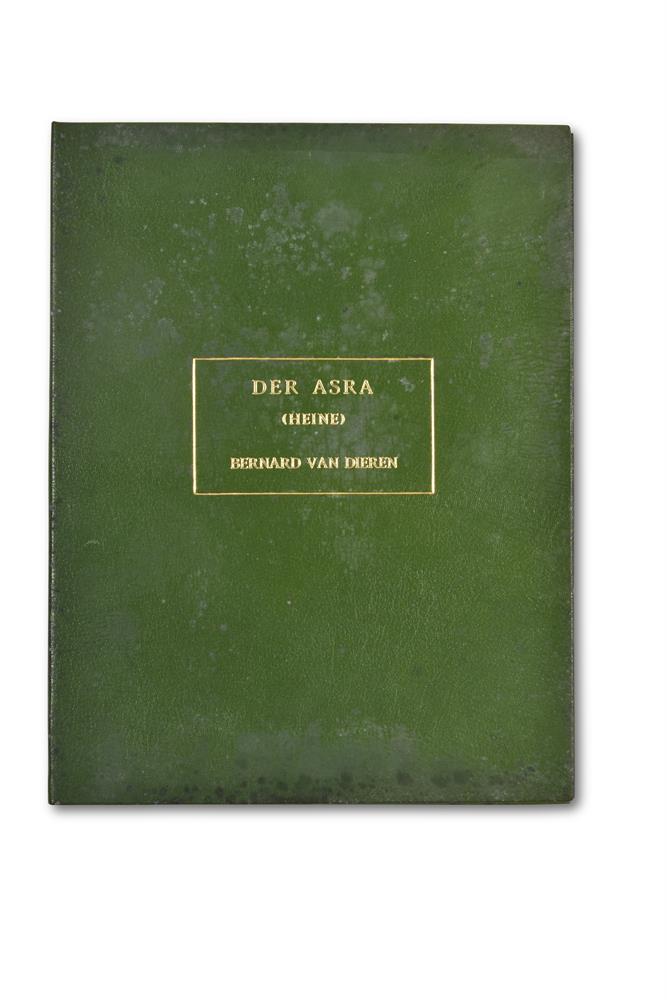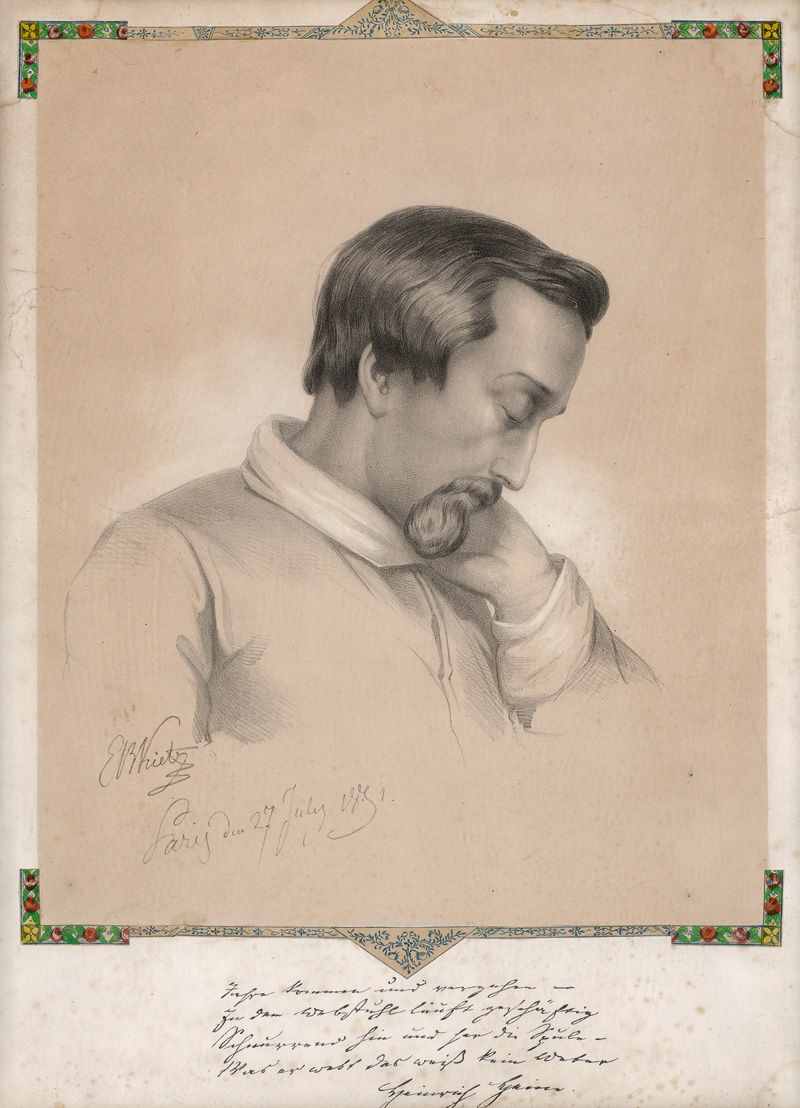Heinrich Heine (1797-1856)
Letter signed ('Heinrich Hein[e]') to [Alfred] Meissner, Paris, 1 November 1850
In German. Three pages, 213 x 135mm, on blue paper, bifolium. Provenance: Sotheby's, 14 February 1986, lot 486.
'Truth in feeling and thinking helps one a great deal in prose: a good style is very difficult for a liar'. Heine received Meissner's letter brought by his father, but a crisis in his health prevented enjoyment of the visit: he thanks Meissner for a favourable article, and praises his Ziska: 'I am very pleased that you not only display so much poetic talent, which I immediately noticed when I read your "Ziska", but that you also have such a fine ear for German prose, which is encountered much more rarely than poetry amongst Germans. Truth in feeling and thinking helps one a great deal in prose: a good style is very difficult for a liar'. Heine goes on to ask news of the Musenalmanach, about which he has questioned several Germans, amongst them 'den trauernden west-östlichen Schwalben-Rabbi Wihl': if it does come out, he is willing to contribute. He laments his declining health ('My health still looks miserable, and I notice with a shudder that my back is growing crooked') and refers with rather pantomime rage to an opponent, 'the creeping bug who wrote the book about the February Revolution and whose name I won't mention here because of the smell, it seems that this insect, out of anger towards me and my wife in relation to you, dear friend, and our wide-eyed Elise, has allowed himself a most shabby can-can'.
Ich freue mich sehr, daß Sie nicht bloß so viel poetische Begabniß an den Tag legen, was ich Ihnen gleich abmerkte, als ich Ihren „Ziska" las, sondern daß Sie auch ein so feines Ohr für deutsche Prosa haben, was viel seltener noch als Poesie bey den Deutschen angetroffen wird. Wahrheit im Fühlen und Denken hilft einem sehr viel in der Prosa, dem Lügner wird der gute Stil sehr erschwert ... Es scheint, daß die schleichende Wanze, die das Buch über die Februarrevoluzion geschrieben und deren Namen ich hier nicht nennen will des Geruches wegen, es scheint, daß dieses Insekt aus Aerger über mich und meine Frau in Bezug auf Sie, lieber Freund, und unsere großäugige Elise einen gar schäbigen Cancan sich erlaubt hat ...
Alfred Meissner (1821-1885) was an Austrian poet: his epic poem Ziska was published in 1846; Meissner had lived in Paris until earlier that year before returning to Prague. His memoirs of Heine appeared in 1854 and 1856. First published in the Sämmtliche Werke, Volume 21, no.271.
Heinrich Heine (1797-1856)
Letter signed ('Heinrich Hein[e]') to [Alfred] Meissner, Paris, 1 November 1850
In German. Three pages, 213 x 135mm, on blue paper, bifolium. Provenance: Sotheby's, 14 February 1986, lot 486.
'Truth in feeling and thinking helps one a great deal in prose: a good style is very difficult for a liar'. Heine received Meissner's letter brought by his father, but a crisis in his health prevented enjoyment of the visit: he thanks Meissner for a favourable article, and praises his Ziska: 'I am very pleased that you not only display so much poetic talent, which I immediately noticed when I read your "Ziska", but that you also have such a fine ear for German prose, which is encountered much more rarely than poetry amongst Germans. Truth in feeling and thinking helps one a great deal in prose: a good style is very difficult for a liar'. Heine goes on to ask news of the Musenalmanach, about which he has questioned several Germans, amongst them 'den trauernden west-östlichen Schwalben-Rabbi Wihl': if it does come out, he is willing to contribute. He laments his declining health ('My health still looks miserable, and I notice with a shudder that my back is growing crooked') and refers with rather pantomime rage to an opponent, 'the creeping bug who wrote the book about the February Revolution and whose name I won't mention here because of the smell, it seems that this insect, out of anger towards me and my wife in relation to you, dear friend, and our wide-eyed Elise, has allowed himself a most shabby can-can'.
Ich freue mich sehr, daß Sie nicht bloß so viel poetische Begabniß an den Tag legen, was ich Ihnen gleich abmerkte, als ich Ihren „Ziska" las, sondern daß Sie auch ein so feines Ohr für deutsche Prosa haben, was viel seltener noch als Poesie bey den Deutschen angetroffen wird. Wahrheit im Fühlen und Denken hilft einem sehr viel in der Prosa, dem Lügner wird der gute Stil sehr erschwert ... Es scheint, daß die schleichende Wanze, die das Buch über die Februarrevoluzion geschrieben und deren Namen ich hier nicht nennen will des Geruches wegen, es scheint, daß dieses Insekt aus Aerger über mich und meine Frau in Bezug auf Sie, lieber Freund, und unsere großäugige Elise einen gar schäbigen Cancan sich erlaubt hat ...
Alfred Meissner (1821-1885) was an Austrian poet: his epic poem Ziska was published in 1846; Meissner had lived in Paris until earlier that year before returning to Prague. His memoirs of Heine appeared in 1854 and 1856. First published in the Sämmtliche Werke, Volume 21, no.271.
.jpg)














Try LotSearch and its premium features for 7 days - without any costs!
Be notified automatically about new items in upcoming auctions.
Create an alert